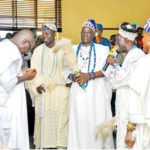Corruption is the main business of the ruling class just as it has become the major pursuit of the hoi polloi. The nation’s leaders at every level assume they occupy public office for private gains. They create crevices that would facilitate the diversion of resources from government coffers to themselves and their cronies. And they do this barefaced, daring anyone to challenge their impunity.
Almost all activities of those in leadership in the country are geared towards self-enrichment at the expense of the people. The same contracts are awarded several times without the projects being executed. The nation’s refineries are not functioning optimally as a result of corruption and the country is forced to depend on imported fuel while the Nigerian National Petroleum Corporation (NNPC) gleefully pays billions of Naira as subsidy to importers who are mainly kith and kin of those in power.
ALSO READ: Leave us alone, face your problems in Kaduna, PDP cautions el-Rufai
It is corruption that killed the railway system and made most of the roads in the country impassable. Corruption supervised the interment of the education system to the extent that those who can afford the cost now send their children abroad for cutting edge education while the poor make do with whatever the local schools can offer. Corruption is also responsible for the lack lustre health services in the country. Although there are efforts in some quarters to improve health facilities in different parts of the country, the reality is that most hospitals in the country are incapable of delivering on the expectations of the public. Unfortunately, those responsible for the destruction of the health facilities in the country jet to other countries for medical attention at the slightest discomfort.
Bad as it is that the leaders are corrupt, a very serious dimension to it is the seeming acceptance of corruption as a way of life by the followers. If the leadership is corrupt and the followership is not, there is hope for the country but when the mass of the people join the leaders to see corrupt practices as a normal way of life, then end may be at hand for that society.
Hardly can any service be rendered by civil servants without money changing hands; you pay a bribe to obtain a form that is expected to be given out free, you also give a bribe to get it submitted. You have to bribe somebody to get your child’s birth certificate; you also give a bribe to get your parent’s death certificate. To get your child admitted into a government school you pay a bribe. To secure a safe place in the parking lot, you tip a security officer. Although it is said that bail is free, those who refuse to play the game according to the dictates of police officers are remanded in police custody for days on end even when they are not supposed to be kept in custody beyond 48 hours.
The cancer of corruption has also spread to the communities.
Awhile ago, while travelling to Lagos, as usual there was a problem on the road and commuters had to go through some communities to circumvent the problem area. To the dismay of everyone, the youth in one of the communities had erected a barricade along the newly found pathway out of the Lagos-Ibadan expressway malaise and were demanding money from motorists. Many a motorist grudgingly complied. But there was a particular one who asked for explanation from the youth on why he had to pay. This incensed the youth who threatened to not only beat him up but to also burn down his vehicle.
“Do you ask those in Abuja why they take the money they take? Do you ask those in the state capitals why they steal our money? What is the proportion of what we are asking you to pay compared with what your leaders steal every second? Who are you to question us? If you refuse to pay, we will beat you up and burn your car,” a voluble member of the group said.
To the utter chagrin of everyone, other members of the community, young and old, hailed the young man. They all directed the inquisitor to take his inquest to Abuja. With that, it was impossible for anyone to pass through the route without settling the community members.
So, corruption now has the backing of everyone in the country and that is dangerous. A society that does not see anything wrong with corruption can never experience development. Once a society deems corruption as normal, it will fail to challenge the wrongs visited on it as a result of corruption. Pervasive corruption leads to increase in human rights abuse without any expectation of redress.
It therefore means that something new has to be tried and my thinking is that capital punishment is the way out of the stranglehold of corruption on the country. Although China is not the least corrupt country in the world, the rate of corruption in that country has greatly reduced since it introduced capital punishment as reward for corruption. If capital punishment has been able to bring down corruption in China, it can have the same effect in Nigeria. If we hope to see the end of corruption in Nigeria, we have to deter those who are easily swayed into corrupt practices and the best deterrence is death sentence.







